
The Rush Limbaugh Show
November 30, 2018
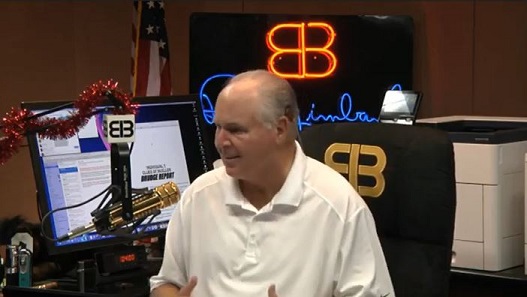

California’s late votes broke big for Democrats. Here’s why GOP was surprised
November 30, 2018
by John Wildermuth and Tal Kopan
California Democrats took advantage of seemingly minor changes in a 2016 law to score their stunningly successful midterm election results, providing a target for GOP unhappiness that is tinged with a bit of admiration.
Some Republicans have cast a skeptical eye on Democrats’ use of “ballot harvesting” to boost their support. The idea’s backers say it’s just one of several steps California has taken to enable more people to vote.
Few people noticed when Gov. Jerry Brown signed the changes in AB1921 into law two years ago. In the past, California allowed only relatives or people living in the same household to drop off mail ballots for another voter. The new law allowed anyone, even a paid political campaign worker, to collect and return ballots — “harvesting” them, in political slang.
The change was strictly a public service, said Assemblywoman Lorena Gonzalez, D-San Diego, author of the bill. The old rules, she said, “simply provide yet another obstacle for individuals attempting to vote.”
Republicans didn’t agree, and the measure passed the Legislature on a largely party-line vote.
They felt the hit on Nov. 6 — and in the days after, as late-arriving Democratic votes were tabulated and one Republican candidate after another saw leads shrink and then evaporate. This week, a seventh GOP-held congressional seat flipped to the Democrats, leaving Republicans controlling a mere seven of California’s 53 House districts.
In Orange County alone, where every House seat went Democratic, “the number of Election Day vote-by-mail dropoffs was unprecedented — over 250,000,” Fred Whitaker, chairman of the county Republican Party, said in a note to supporters. “This is a direct result of ballot harvesting allowed under California law for the first time. That directly caused the switch from being ahead on election night to losing two weeks later.”
Some national Republicans expressed befuddlement with what was happening to their party in California. In an interview with the Washington Post, House Speaker Paul Ryan of Wisconsin called California’s election system “really bizarre” and said he couldn’t even begin to understand what ballot harvesting is.
“We were only down 26 seats (nationally) the night of the election and three weeks later, we lost basically every California race,” he said. “Point being, when you have candidates that win the absentee ballot vote, win the day of the vote, and then lose three weeks later because of provisionals, that’s really bizarre.”
However, this was no spur-of-the-moment effort by the Democrats, said Shawn Steel, the California GOP’s delegate to the Republican National Committee.
“This was not done at the last minute,” he said. “It started the day after Jerry signed” the bill.
Rep. Jeff Denham of Turlock (Stanislaus County), one of the House Republicans who saw victory slowly turn to defeat after election day, agreed with Ryan Thursday that California’s count should go more quickly. “Counting ballots two weeks after the vote is something that Californians shouldn’t have to put up with,” he said.
But in an earlier interview after it was clear he’d lost, Denham said the GOP had been slow to adapt to changes in California’s election system.
“One of the lessons that the GOP needs to learn out of this election cycle is how to work within all of the new rules, same-day voter registration, motor voters,” Denham said. “There have been a lot of changes in laws that I think have caught many in the Republican Party by surprise. You can’t just run a traditional campaign as you did before.”
He added, “If one party’s harvesting ballots, both parties need to do it.”
Across the state there were reports of groups collecting ballots and dropping them off at polling places and election offices.
“We certainly had that going on here, with people dropping off maybe 100 or 200 ballots,” said Neal Kelley, Orange County’s registrar of voters. “We also had voters calling and asking if it was legitimate for someone to come to their door and ask if they could take their ballot” and deliver it to the polls.
For Democrats, the ballot harvesting was all part of a greater effort to get out the vote from their supporters, particularly from occasional voters.
“We beat Republicans on the ground, fair and square,” said Katie Merrill, a Democratic consultant deeply involved in November campaigns. “Many of the field plans included (ballot harvesting) as an option to deliver voters or their ballots” to the polls.
Those efforts involved identifying voters who might support Democratic candidates and ignoring those who wouldn’t.
In one Orange County household, for example, both the husband and wife were longtime Republicans, said Dale Neugebauer, a veteran Republican consultant. Democratic volunteers came by the house four times, each time asking to speak only with their 18-year-old daughter, a no-party-preference voter, and asking if she wanted them to pick up her signed and completed ballot.
That’s a perfect example of the “thorough and disciplined” ground game the Democrats used, said Merrill.
“We were not wasting time talking to people who weren’t going to vote for Democrats,” she said.
Many of those harvested ballots arrived in the waning days of the election, adding to the flood of votes that couldn’t be counted on election day. And those late ballots broke heavily for the Democrats.
“Absolutely, ballot harvesting played a very significant role,” said Neugebauer, who worked most recently for Orange County Rep. Dana Rohrabacher, another Republican who lost his seat. Democrats had “a huge advantage by executing a plan to gather ballots from voters.”
“I have a little bit of professional admiration for how well the Democrats executed their plan,” Neugebauer admitted.
While the late vote tally typically favors Democrats, the partisan advantage this year was staggering.
In the Central Valley’s 10th Congressional District, for example, Denham led Democrat Josh Harder by 1,287 votes the morning after the election. As of Thursday, with almost all of the late ballots counted, Harder was ahead by 7,416 votes.
In Orange County, Republican Rep. Mimi Walters of Irvine saw her 6,074-vote lead over Democrat Katie Porter turn into an 11,866-vote deficit.
Speaker Ryan was among the Republicans who couldn’t explain what happened.
“When you win the absentee ballots and you win the in-person vote, where I come from, you win the election,” Ryan said. “I’m not saying there’s anything nefarious about it, because I just don’t know, but we believed we were up about six seats in California the night of the election, now I think we lost just about every single one of those.”
For Democrats, Ryan’s comments were little more than sour grapes from a GOP leader who is retiring after his party was mauled in the midterms.
“Unlike other places in the country, in California we believe in actually counting every vote,” said Rep. Pete Aguilar, D-Redlands (San Bernardino County). “That is sometimes confounding to some of my colleagues, but I think that’s what’s at play here.”
Badly outnumbered in the Legislature, California Republicans have no hope of undoing the new rules. Instead, they’re going to have to adapt.
“The Democrats are creating a new, highly efficient tool to turn out voters,” said Neugebauer, the GOP consultant. “If Republicans can’t find a way to match it, we’re going to lose more elections all over the country.”

Questions about stolen elections not going away in California...
November 30, 2018
By Monica Showalter Once again, this happened: TJ Cox defeated three-term Republican Rep. David Valadao on Wednesday, giving Democrats a gain of seven House seats in California and 40 nationwide – the party's strongest midterm showing since the Watergate era in the mid-1970s. Cox clinched his victory more than three weeks after election day, when updated results from Fresno and Kings counties pushed his lead over Valadao to 529 votes. The contest was the country's last remaining undecided congressional contest. Cox, 55, trailed the GOP lawmaker by nearly 4,400 votes on election night but steadily gained ground as mail-in and other ballots tipped his way. That follows the obvious funny stuff that went with the sudden surge of "found" ballots that got Republican congressional candidate Young Kim displaced from her congressional victory to Democratic Party machine pol Gil Cisneros. Both Kim and Valadao were terrific Republicans who had big leads on election night and, in both cases, had the elections actually called for them until...all these found ballots got found, and the counting went on and on and on until the Democrat won. Even outgoing House speaker Rep. Paul Ryan, the nambiest-pambiest of all Republicans, pretty well admitted there was a problem. According to Carla Marinucci of Politico: "We were only down 26 seats the night of the election and three weeks later, we lost basically every California race,'' Ryan said Thursday. "This election system they have – I can't begin to understand what 'ballot harvesting' is." Seriously, isn't it all just the wildest of coincidences? Even more coincidental, all the voting went one way: to the Democrats. A powerful op-ed by California Republican National Committee leader Shawn Steel pretty well lays out what happened, why the Democrats could scarf up all but a few of California's congressional seats, even though they came in districts that were always traditionally Republican, leaving California with almost zero Republican representation whatever in what has become a Stalinist one-party state monopoly with no competition and a revolutionary left-wing agenda. He sums it up in the SEO as follows: "No one needs voter fraud when all the rules are changed." He points out that creepy practices such as "ballot harvesting" (where Democratic operatives gather mail-in ballots and oh, so helpfully turn them in), which is illegal in most states, and California's bad Department of Motor Vehicle registrations, loaded with errors, had a lot to do with it. He also points to youth "pre-registration" voting sign-ups, even though kids get registered whether they like it or not at the DMV; felons getting their crimes downgraded to misdemeanors so as to get to vote from jail; illegal aliens voting – studies show it was a lot of them; and involuntary mail ballots (I get those, and I most certainly didn't ask for them) mean lots of paper ballots lying around from people who may not want to vote or don't live here, sitting in mailboxes – that somehow get filled in and turned in. It really is a corrupted process, and not surprisingly, Democrats are the sole beneficiaries while the state's many traditional Republicans are shut out and get nothing. Most disgusting of all is California secretary of state Alex Padilla's snide insistence that the voting process is all clean, and the spectacle of all people wanting to vote socialist (just like the Stalin days in Russia), far from being strange, is what "we call democracy." Leon Trotsky could not have said it better. It's not surprising he talks like that. It is, after all, his show. He's one of the officials who refused to cooperate with President Trump's electoral integrity commission on fraudulent voting, something that eventually had to be shut down. With him yelling "democracy," all we can wonder now is what he is hiding.

Blue State Blues: Democrats Stole the Election in California — Legally, Through ‘Ballot Harvesting’
November 30, 2018
by Joel B. Pollak California Democrats “stole” the midterm election using a new method that is illegal elsewhere but completely legal in the Golden State: a practice called “ballot harvesting,” which allows third parties to submit mail-in ballots for voters. It sounds “bizarre,” as outgoing Speaker of the House Paul Ryan (R-WI) described it to the Washington Post on Thursday — but it is absolutely true: Democratic operatives handed in pile after pile of other people’s ballots. And Demorats are proud of it, mocking Republicans for failing to take advantage of a new law signed by Governor Jerry Brown in 2016, over GOP objections, that allows “ballot harvesting,” and which some Republicans are now blaming for their defeat. The practice explains several mysteries about the 2018 election, such as: why mail-in ballots caused massive shifts toward Democrats in races Republicans thought they won on Election Night; why Republicans won the turnout battle in the primary, but lost it in the general election; and why Democrats with party backing defeated fellow Democrats without it — even when the latter had more money. “Ballot harvesting” by Democratic Party operatives — a surprise tactic they likely saved for the general election — appears to have made the difference. The San Francisco Chronicle reported Thursday that Democrats ran a disciplined, door-to-door campaign offering to deliver voters’ ballots to the polls:
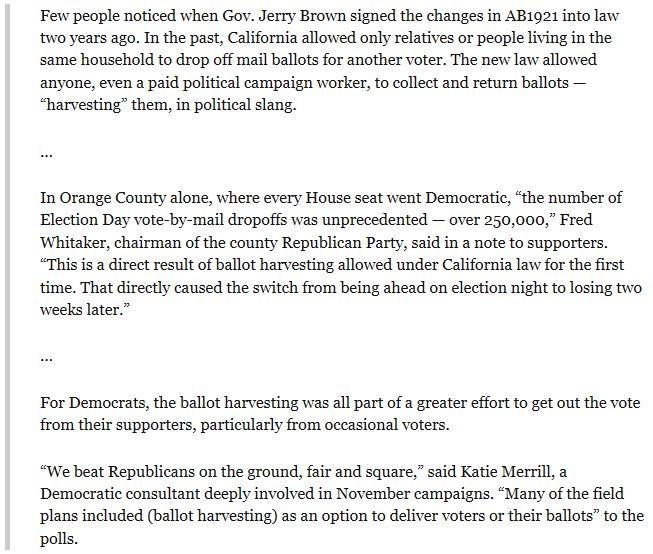
Republicans, in contrast, simply focused on traditional turnout operations — and lost badly. In the days after the election, some Republicans speculated that there had been “voter fraud” in the state. And, true, Los Angeles County prosecutors busted a ring that bribed the homeless to register fraudulently. The Department of Motor Vehicles also registered 1,500 ineligible voters. Yet “ballot harvesting” likely had a bigger effect. Democrat Secretary of State Alex Padilla mocked Republican concerns, telling Politico: “What they call strange and bizarre, we call democracy.” But it is democracy as practiced almost nowhere else in the world — except for one-party banana republics in failed third-world states, where the sight of ruling party apparatchiks dropping off bundles of ballots is not unusual. Eric Eggers, author of Fraud: How the Left Plans to Steal the Next Election, told Breitbart News Tonight on Thursday that “ballot harvesting” also creates opportunities for coercion and bribery. Nevertheless, it is legal. And as Shawn Steel, the California committeeman for the Republican National Committee (RNC), wrote on Wednesday, it is not necessary for Democrats to break the law when fraud has effectively been legalized, through “ballot harvesting” and other methods. “Merciless and unsparing, California Democrats have systematically undermined California’s already-weak voter protection laws to guarantee permanent one-party rule,” he said. But as Democrats point out, there is no reason that Republicans cannot use the same methods in California. So Republicans should take them up on it. There is no alternative. RNC chair Ronna McDaniel patted herself on the back after the election, and President Donald Trump endorsed her for re-election on Thursday. But she lost the House. If she hopes to succeed in 2020, she had better learn to steal elections legally — just like the Democrats do.

Paul Ryan Is Right: California's Election Laws Are Vulnerable To Fraud
November 30, 2018
By Bre Payton Outgoing House Speaker Rep. Paul Ryan (R-Wisconsin) made headlines Thursday morning when he said GOP losses in the state of California were suspicious at a Washington Post Live event. “California just defies logic to me,” Ryan said about the Golden State’s election results. “We were only down 26 seats the night of the election, and three weeks later, we lost basically every California contested race. This election system they have — I can’t begin to understand what ‘ballot harvesting’ is.” “Do you think there’s something wrong with it?” WaPo’s Paul Kane asked. “No, I just think it’s weird,” Ryan replied. In response, California’s secretary of state, Alex Padilla condemned Ryan’s remarks and defended California’s election laws.
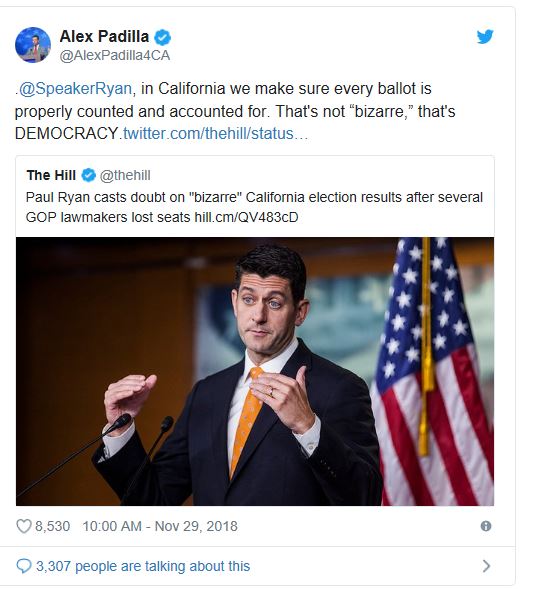
Ryan isn’t the only Republican to scratch his head over this. Six Republican candidates were leading in congressional races across California on Election Night, only to see the results flip to Democratic victories weeks later due to California’s lax election laws. In California’s 39th Congressional District, Republican candidate Young Kim was widely anticipated to snag an electoral victory and fill outgoing Rep. Ed Royce’s shoes, becoming the first Korean-American woman to serve in Congress. On election night and the next day, she held a wide lead ahead of Democrat Gil Cisneros. While waiting for the official ballot tally, Kim flew to Washington D.C. to attend orientation events for freshmen members of Congress, including the class photo op, but as ballots continued to pour in up to a week after the election, the results flipped and she ultimately lost.
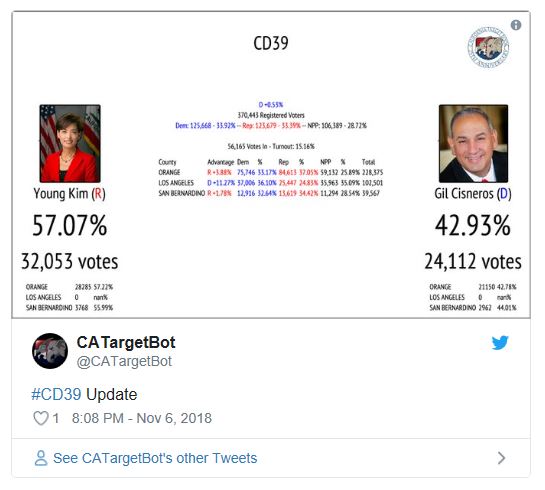
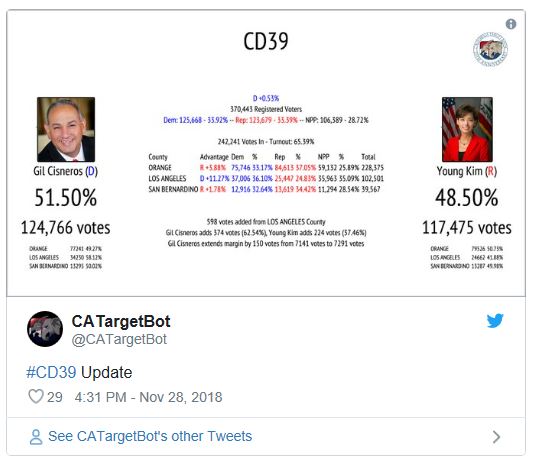
California’s Wacky Election Laws, Explained
Watching every single contested congressional race flip from Republican to Democrat days after the election is, as Ryan put it, weird. While Here are six reasons California’s electoral system is deeply flawed. 1. The DMV automatically registers people to vote, even illegal immigrants. Virtually everyone who interacts with the state’s DMV gets automatically registered to vote under California’s Motor Voter program, but this program is riddled with errors and has even registered illegal immigrants. In September, the Los Angeles Times reported that 23,000 voters were registered incorrectly by the DMV. Less than a month before the election, DMV officials revealed that an additional 1,500 people were registered to vote when they should not have been, including some illegal residents, minors too young to vote, and felons who were supposed to be ineligible. 2. ‘Ballot Harvesting’ allows political operatives to drop off other people’s ballots. A new state law allows third parties to pick up ballots and drop them off at polling locations on behalf of that person, a practice known as “ballot harvesting.” In video footage that surfaced last month, a woman who identifies herself to a California resident as Lulu is seen knocking on someone’s door and offering to deliver their absentee ballot, but “only to, like, people who are supporting the Democratic Party.” In an e-mail to supporters, Orange County GOP chair Fred Whitaker attributed the party’s losses in longtime Republican districts to ballot harvesting, the San Fransisco Chronicle reported.

In his remarks Thursday, Ryan singled out this practice as a contributing factor to the GOP losses, saying they were confusing and bizarre. Watching the woman in the aforementioned video say she’s collecting ballots but only for Democratic voters is definitely odd and emphasizes how those picking up the ballots have an incentive to mess with them. What would a ballot collector working on behalf of a liberal group do to a ballot cast by someone who answered the door wearing a “Make America Great Again” hat? Would that ballot actually get taken to the polls, or tossed in the trash? And what about low-information voters who hadn’t been planning to cast a ballot? If someone showed up at their door asking for their ballot, would they feel obligated to quickly fill it out and give it to them? There seems to be very little benefit for the actual voter (I mean, how hard is it to drop a filled-out ballot in one’s mailbox on election day?) and a huge incentive for the “harvester” to act shady. 3. California allows voters to register to vote and cast a ballot on Election Day.
That’s right. On Election Day, one can show up to a polling location and register to vote and cast a ballot all on the same day by taking advantage of the Conditional Voter Registration process, which is explained in this YouTube video featuring millennials with pastel-colored hair who could not get it together and register to vote on time like the rest of us. 4. Voters can cast a ballot at the “wrong” polling place. California allows provisional ballots, which are essentially regular ballots that get put into a special envelope before they’re stuffed into the box. These are for people who show up at the “wrong” polling location or who changed their mind about voting by mail but want to vote anyway, according to California’s Secretary of State website. These ballots are then supposed to be checked against other rolls to make sure the person did not vote twice, but there are reasons to doubt the state’s ability to properly execute this. 5. Counties are allowed to mail absentee ballots to every voter in the county.
“This election, every voter in Madera, Napa, Nevada, Sacramento and San Mateo counties received an absentee ballot — whether they requested one or not,” Shawn Steel writes for The Washington Times. “Beginning in 2020, every county in California except one will be allowed to follow suit.” 6. Absentee ballots that arrive a week later will still be counted. Unlike most other states, absentee ballots cast in California do not need to be delivered by Election Day, but merely postmarked on that day. This means absentee ballots can come pouring in up to a week later and alter the outcome of the election. While a number of these programs and laws certainly make it more convenient for voters, they also create a nightmare scenario for quick election results tallying and a number of vulnerabilities in the integrity of the electoral system. Mailing a ballot to every voter in the county, allowing these ballots to arrive up to a week after Election Day, and allowing individuals to register to vote and cast a ballot on the day of an election give ample opportunity for an individual intent on committing voter fraud to do so. California needs to rethink its program that has enabled an unknown number of illegal immigrants and minors to be improperly registered to vote. It needs to tighten deadlines on voters in order to get a quicker count that doesn’t take weeks to tabulate. Fortunately, there haven’t been reports of widespread fraud that would necessitate drastic measures to ensure the results were legitimate. But after the debacle in Florida, watching every single contested congressional race flip from red to blue weeks later is not a good look. California’s legislature and secretary of state need to take Republican concerns about election integrity seriously.

GOP cries foul after California thumping
November 29, 2018
"What they call strange and bizarre, we call democracy," says the Democrat who oversees the state’s elections.
By CARLA MARINUCCI
SAN FRANCISCO — A growing chorus of Republicans are casting doubts about the integrity of the voting system in California, where the party lost at least six House seats in the midterm election — including a handful where the GOP at first appeared to have emerged victorious on election night.
A sentiment that began as a murmur among hard-line conservatives jumped to the Republican mainstream Thursday when House Speaker Paul Ryan suggested that the state’s “bizarre” voting system “just defies logic to me,” and may have contributed to the GOP’s historic thumping in California.
"We were only down 26 seats the night of the election and three weeks later, we lost basically every California race,’’ Ryan said Thursday. “This election system they have — I can’t begin to understand what ‘ballot harvesting’ is.”
In part due to mail-in and provisional ballots that delivered the margin of victory to Democratic challengers in a handful of seats, California’s Republican delegation appears to have been slashed in half — in the new Congress, Republicans are likely to hold just seven of the state’s 53 House seats, the party’s lowest number since the 1940’s.
Ryan’s statements drew a sharp rebuke from California Secretary of State Alex Padilla, who said Thursday that “it is bizarre that Paul Ryan cannot grasp basic voting rights protections.”
Padilla, a Democrat who oversees the elections process in a state with 19 million registered voters, told POLITICO that “our elections in California are structured so that every eligible citizen can easily register, and every registered voter can easily cast their ballot.”
That concept, he said, “[might be] strange for Speaker Ryan, who comes from Wisconsin,’’ but Padilla added, “I’m happy to walk him through the bottom line.”
Ryan’s comments about a state’s elections process put him in league with some prominent California Republicans who have recently expressed befuddlement — and anger — about the series of GOP incumbents whose defeats came after officials completed the tallies of millions of absentee and provisional ballots.
In an op-ed earlier this week, former state GOP Chair Shawn Steel, a member of the Republican National Committee, stopped short of claiming outright fraud in the aftermath, but charged that California’s moves to expand vote by mail, “motor-voter” registrations, early voting and allowing voting for ex-felons have “systematically undermined” voter protection laws.
Steel cited Republican Young Kim’s loss to Democrat Gil Cisneros in a heated Orange County race to replace Republican Rep. Ed Royce, saying that Kim’s defeat was rooted in Democratic moves to “erode voter integrity” in California.
“How does a 14-point Republican lead disappear? Merciless and unsparing, California Democrats have systematically undermined California’s already weak voter protection laws to guarantee permanent one-party rule,’’ Steel wrote in the column published Wednesday.
Other Republicans, including President Donald Trump and conservative House candidates like former state Assemblyman Tim Donnelly, have gone even further, suggesting — without providing evidence — widespread voter fraud that possibly involved “millions” of ballots cast illegally by undocumented immigrants.
The losing GOP incumbents include Reps. Mimi Walters, Steve Knight, Jeff Denham and Dana Rohrabacher. Democrats also flipped open seats held by retiring GOP Reps. Darrell Issa and Ed Royce.
On Wednesday, battered California Republicans appeared to have suffered another defeat — GOP Rep. David Valadao, who was originally declared the winner by The Associated Press. His Democratic opponent, TJ Cox, gradually pulled ahead in post-Election Day tallies after trailing by nearly 4,400 votes on election night, and formally declared victory.
An angry Padilla said complaints by Republicans about California’s voter outcome is “nothing but an excuse” for the party’s own failures at the ballot box.
“We’ve been hearing Trump for years now make claims of massive voter fraud and millions of illegal votes and it is simply not true. And just as Trump’s ego could not handle losing the national popular vote and losing so badly in California,’’ now it appears Ryan is trying to “drum up an excuse” for the losses, he said.
“It’s their own fault that they fear a large and diverse electorate,’’ he told POLITICO.
California Democrats charge GOP leaders are now desperately trying to undermine confidence in the election without any substantive evidence to back their claims.
“Good luck to them using that line of attack … they’re basically being extinguished in California, and they don’t get it,’’ says veteran Democratic consultant Garry South. “So to cast doubt on the results here, instead of doing some soul-searching about why California is basically shutting out Republicans in every office ... the only place they have to look is in the mirror.”
Darry Sragow, the publisher of the California Target Book, a nonpartisan election resource, agrees that “for them to suggest the system here is rigged is beyond outrageous.’’
Sragow, who teaches election law at the University of Southern California, says the complaints are especially ludicrous in light of recent elections in Florida and Georgia, where he said Republicans have sought “to deny the right to vote to people of color, to college students and the poor people."
Voting experts like Sragow say Republican critics are refusing to accept the realities of a solidly-blue state that has made every effort to make voting easier and more accessible: including early voting, vote by mail — now the preferred means for nearly two-thirds of state voters — and allowing voters to register and vote provisionally up until the day of the election. The changes were manifested in 2018 as millions of younger voters cast ballots for the first time — the overwhelming number of them Democratic, South noted.
But Steel, in his op-ed, charged that Democrats have put their thumb on the electoral scale with efforts that include so-called ballot harvesting — now legal after the passage of Assembly Bill 1921, which he said "now allows anyone," including campaign operatives, to collect and return an absentee ballot.
Strategist Rob Stutzman, a Republican moderate, says that while charges of widespread fraud are completely “absurd,’’ there may be some real issues that merit a closer look at “ballot harvesting” practices.
Stutzman said some Democratic groups apparently became very efficient in get out the vote efforts that included collecting mail ballots en masse, and making sure they got to the local registrar.
And while concerns about those groups are not about fraud, he said, there may be legitimate questions raised “about people honestly and genuinely voting their own ballot,’’ and about whether the new efforts may open the door for outside influences — whether money or “a pack of cigarettes” — to influence someone's vote. He said that “it would be nice to have some explanation on whether these operations were bounty-oriented because that creates a huge incentive for trouble.”
Padilla told POLITICO this latest criticism from Republicans appears “an attempt to smear the pro-voter policies that we have” in California, including newer efforts that he said were designed to “empower voters to decide for themselves who they feel most comfortable with” in returning their ballot — especially if they are older or handicapped and need assistance in doing so.
“What they call strange and bizarre," he said, "we call democracy.’’

The Cheat Is On
November 29, 2018
You've got to hand it to Democrats. Instead of committing voter fraud, they've got a better idea -- making it legal! And judging by this midterm's House races, the strategy finally paid off. In places like California, the GOP sat in stunned disbelief as their double-digit leads evaporated like a puff of smoke on election night. Seats in reliably-Republican areas like Orange County vanished in races that, days before, weren't even close. Candidates like Young Kim, one of the shoe-ins heading into Tuesday, watched Democrats chip away at her lead in a cloud of provisional ballot-counting. A week later, she lost. By that point, the questions were already swirling. What happened? And how had pollsters gotten California so wrong? Turns out, the plan had been set in motion years ago -- thanks to some crafty Democrats, who decided if they couldn't win by the rules, they'd just change them. With the help of a liberal legislature and governor, Democrats started systematically rewriting the rules to box out Republicans. In an article that will make most Americans' blood boil, the Washington Times explains exactly how the Left pulled off their California stunt. And how they could take that same playbook to a state near you. Of course, it's a unique situation in California, where the ratio of Democratic leaders makes even Republican seats ripe for stealing. One of the biggest breakthroughs came in 2016 when the state passed a law that lets anyone "walk into an elections office and hand over truckloads of vote-by-mail envelopes with ballots inside," Townhall explains -- no questions asked, no verified records kept." That opened the door to what a lot of people witnessed this year: Democrats knocking on doors to either "help" people vote or pick up their ballots for supposed delivery. It's called vote harvesting. Most states outlaw it. In California, the idea was so controversial that even the Los Angeles Times editorial board fought it. "Ballots are supposed to be sacrosanct," the editors write. "When you vote at your local polling place, poll workers don't urge you to support this candidate or that." The Democratic operatives who show up at people's houses to collect their ballots can strong-arm voters, cajole them, or outright defraud them. There is no safeguard, they point out, "to ensure that the ballots make it to official election facilities in time to be counted." Then there's the "integrity of the ballot itself. It's one thing to trust the U.S. Postal Service, which presumably doesn't have an interest in state and local races, to deliver your ballot. It's quite another to trust a stranger who shows up at the door one day promising to make sure your vote gets counted." What's to stop someone from trashing those ballots? Or, as Attorney General Ken Paxton discovered in Texas, vote for you? "The harvesters sit around and fill these out by the hundreds, often by the thousands," said one political consultant. The abuse is so rampant that states like Montana are weighing a widespread crackdown. People have been caught casing nursing homes, low-income housing, and illegal immigrant work sites offering -- in the name of "community service" -- to make voting more "time efficient." RedState posted a video of just how methodical Democrats have been this election. At one house, a woman named Lulu rang the doorbell, knew the name of the people inside, and then explained that they're offering a "new service, but only to, like, people who are supporting the Democratic Party. It's a service; I'm just trying to pick up your ballot and show you how to do it if you don't know." Unfortunately for Californians, that's just the tip of the manipulation iceberg. There are new laws that let illegal immigrants vote (San Francisco spent $310,000 taxpayer dollars registering 49 of them), prisoners, and -- thanks to a 2015 court ruling -- felons. Then there's the "motor voter fraud." Because everyone who interacts with the DMV in California is automatically registered to vote, the state's RNC committeeman Shawn Steel writes, there've been at least 77,000 cases of double registrations. Democrats also got creative with young people, launching a pre-registration program for 16- and 17-year-olds. It is, Steel warns, a way for the Left to lock in voters "while they're young and more likely to identify as liberal Democrats." "Of the 89,000 minors that participated... only 10 percent registered as Republicans." In some counties this year, absentee ballots were mailed to every adult -- whether they requested it or not! As if that weren't outrageous enough, California accepts ballots up to a week after Election Day and gives voters with rejected ballots a second chance. Liberals are playing the long game. And unless Republicans learn how to beat them at it, no lead -- or seat -- is safe.
Tony Perkins' Washington Update is written with the aid of FRC Action senior writers.

Republicans working to appeal more to Asian voters
November 25, 2018
By Seth McLaughlin - The Washington Times
The GOP nightmare in Southern California closed out last week with Young Kim falling just shy of becoming the first Korean-American elected to Congress.
After a protracted counting, Ms. Kim was about 6,000 votes short of Democratic candidate Gil Cisneros and conceded her race, officially wiping out the last GOP-held seat in once-Republican dominated Orange County.
Mrs. Kim had been a key part of the GOP’s strategy to compete in the area, with party leaders figuring they could shed their “old white male” image and appeal to the surging Asian-American community.
Louis Desipio, a political scientist at the University of California, Irvine, said those plans were severely dented by the results.
“In the Trump era, and particularly in the midterms, the trend we have seen with Asian-Americans being solid Democrat voters was confirmed,” he said. “I think we saw that in a couple of the congressional races where the Asian-American electorate voted Democratic despite the fact you had a Republican Asian-American candidate.”
Mrs. Kim’s loss was particularly bitter for Republicans in and around Orange County who have worked to recruit Asian-American candidates and have had success getting, among others, candidates elected to local and state offices from the area’s Taiwanese, Korean and Vietnamese communities.
But Shawn Steel, a member of the Republican National Committee, said Mrs. Kim’s race wasn’t a good test, saying Mr. Cisneros won because he and his allies pumped massive amounts of cash into the race.
“If we had Mother Teresa for a candidate, she would have lost,” Mr. Steel said.
Mrs. Kim would have been the first Republican member of the Congressional Asian Pacific American Caucus since former Rep. Joseph Cao of Louisiana, a Vietnamese-American who served a single term and lost re-election in 2010 election. About 15 current Democrats have Asian ancestry.
Having made few inroads among black voters and struggling to compete among Hispanics, Republicans had been counting on a better performance among Asian-Americans.
Polling, though, suggests Asian-Americans, who account for about 4 percent of all voters, have been drifting away from the GOP.
The Pew Research Center has been tracking the community’s voting patterns for 20 years. In 1998 they found 53 percent of Asian-Americans identified as Democrats, compared to 33 percent who called themselves Republicans. Today 65 percent call themselves Democrats, and just 27 percent say they side with the GOP.
That tracks stunningly close to this year’s elections where, according to Fox News’ election voter analysis, a compilation of polling of 140,000 people in 47 states in the week leading up to the election, 67 percent of Asian-Americans backed a Democrat in their state’s key race, while just 27 percent voted for a Republican.
Christine Chen, executive director of Asian and Pacific Islander American Vote, a non-partisan group, said the community is moving toward Democrats’ messages on health care, immigration and gun control.
“Where the Republicans are doing a little bit better is around national security, and jobs and the economy, but even then Democrats are neck and neck or a little bit better than them,” said Ms. Chen, whose group conducts its own polling.
Still, Ms. Chen said that a large number of Asian-American voters still don’t identify with either party. And she said roughly half said they never got any outreach from Democrats or Republicans heading into this year’s elections.
“They are still not doing enough to engage this growing electorate,” she said.
President Trump’s presidential victory in 2016 and the GOP’s ability to hold the House in the four previous elections suggests that changing demographics don’t spell automatic doom for Republicans in elections.
But Mr. Desipio said it is going to catch up with them eventually.
“This election, the GOP’s bench, if you will, the face they are presenting to the nation became more white, and more male,” Mr. Desipio said. “Republicans can’t lose all of the minority communities in the United States and still be a viable party in the 2020s.”

Obama less combative in California speech
September 09, 2018
Looking to rally support for several Democratic congressional candidates across California, former President Barack Obama took a more measured tone Saturday -- after a strongly worded speech the day before where he leveled blistering criticism of his successor and the GOP.
Obama said the November midterm elections would give Americans “a chance to restore sanity in our politics” during his 20-minute speech to a crowd of around 900 Democratic faithful at the Anaheim Convention Center, while warning voters of the risks of keeping Republicans in power.
“If we don’t step up, things can get worse,” Obama said. “We have a chance to flip the House of Representatives; to say ‘Enough is enough.’”
But California Republicans said Obama’s appearance would have little impact and may even help their party.
“I wish [Obama] would come [to California] more often because he reminds Republicans of eight years of misery. It reminds the Republicans why these midterms are important.”
- Shawn Steel, Republican from Orange County, Calif.
Some Democratic supporters would disagree.
Macy Bartlett, 17, a Democratic volunteer who registers other young voters in Los Angeles County, told the Orange County Register that Obama’s message will help her effort.
“We just say Obama’s name and it gets people interested,” Bartlett told the newspaper. “He’s such an icon for so many people, and he understands that flipping the House affects everyone.”
Obama led off his appearance with an anecdote about how he was once kicked out of Disneyland for smoking cigarettes on a ride during his days at Occidental College.
"After [a Kool & the Gang] concert, because we were teenagers, you could still kind of hang out in the park, and so we went into the gondolas, and I'm ashamed to say this — so close your ears, young people — but a few of us were smoking on the gondolas," Obama said of his time at Occidental, before he transferred to Columbia University for his junior year.
Saturday’s rally was Obama’s second campaign stop in a string of several planned appearances that Democrats hope will energize voters in an effort to flip 23 seats to take control of the House of Representatives.
He campaigned for seven California Democrats in competitive House district races. Four of those districts are in Orange County, the location of Saturday’s rally and a former GOP stronghold that Hillary Clinton carried by 9 percentage points in the 2016 presidential election.
Statewide, Clinton beat Trump in California by more than 4 million votes.
Republican Rep. Dana Rohrabacher, a Trump loyalist, is running for a 16th term against a real estate investor Harley Rouda in his district, which encompasses parts of Orange County. Gil Cisneros, a Navy veteran and Democratic philanthropist, is vying to replace retiring Republican Rep. Ed Royce.
Obama also praised venture capitalist Josh Harder in his bid to unseat four-term Republican Jeff Denham, and T.J. Cox, who is challenging David Valadao in a district where Democrats hold a 17-point advantage in voter registration. Both districts are in the state’s Central Valley.
On Friday, the former president castigated President Trump and the Republican Party over its brand of politics at a public appearance at the University of Illinois at Urbana-Champaign.
But on Saturday, he said Democrats have a chance to woo independents and Republicans unhappy with the direction of the party.
Trump offered no direct rebuttal to Obama’s speech, but tweeted that Republicans were doing well leading up to the midterms.
“Republicans are doing really well with the Senate Midterms. Races that we were not even thinking about winning are now very close, or even leading. Election night will be very interesting indeed!”
Obama is no stranger appearances in California.
In June, he headlined an expensive fundraiser in Beverly Hills where he participated in a discussion with Democratic National Committee Chairman Tom Perez and attended and attended another Silicon Valley to raise money for candidates in hotly contested House races.
Obama is expected to deliver the same message in Cleveland on Thursday where he will campaign for Richard Cordray, the Democratic nominee for Ohio governor, and other Democrats.
The Associated Press contributed to this story.

Trump asks anti-sanctuary Los Alamitos, Orange County officials to White House to talk immigration
May 11, 2018
By Roxana Kopetman | rkopetman@scng.com| Orange County Register
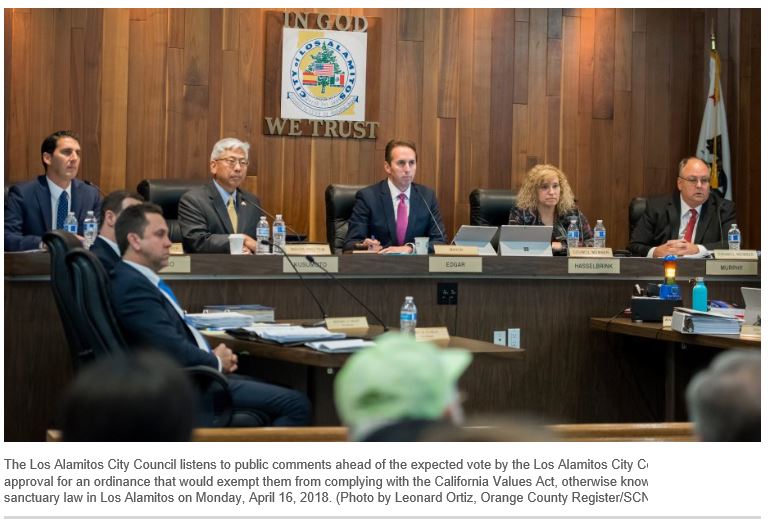
President Donald Trump wants some elected leaders from Southern California who have pushed against the state’s sanctuary laws to come to the White House to talk about immigration.
To that end, he’s invited Los Alamitos Mayor Troy Edgar, Councilman Warren Kusumoto and Orange County Supervisor Michelle Steel to a meeting at the White House next Wednesday. The three are part of a group of officials invited to sit down with Trump for a talk about a growing anti-sanctuary pushback among cities and counties in the state.
“Warren and I are very honored to get this invitation. It’s incredible to have this opportunity,” Edgar said Friday.
“The president asked us to provide stories and an update on what’s going on the ground, and consider suggesting what they can do to help us further,” Edgar said.
Los Alamitos’ recent vote to exempt itself from the California Values Act, which limits cooperation between local and state law enforcement with federal immigration officials, launched a broader anti-sanctuary movement. Elected officials in more than 35 cities and counties have voted to oppose the law since Los Alamitos’ initial action March 19.
Also attending will be Escondido Mayor Sam Abed and San Diego County Board of Supervisors Chairwoman Kristin Gaspar, among others, Edgar said.
Steel, who introduced an anti-sanctuary resolution on the county level within days of Los Alamitos’ action, was the only elected official to greet Trump when he arrived at Los Angeles International Airport in March.
“It was a great privilege to be invited to meet with President Trump to discuss the danger these ‘sanctuary’ laws create in our communities and I look forward to an open and proactive discussion,” she wrote in an e-mail.
A confirmation of the meeting was sent to elected leaders on Thursday. A White House official wrote that the president “is excited to hear your story and get your perspective.” The California group will be joined by Cabinet and senior White House officials in the West Wing, including U.S. Attorney General Jeff Sessions, Edgar said.
As mayor of Orange County’s second smallest city, Edgar said he’s hoping the federal government will intervene in a lawsuit filed by the American Civil Liberties Union of Southern California. The ACLU alleges the city’s new ordinance violates state law and is a waste of taxpayer dollars.
The lawsuit could cost Los Alamitos – population 11,700 – as much as half a million dollars, Edgar and others have said. A GoFundMe “Mayor Edgar’s Stop Sanctuary Law” page, which aims to raise $100,000, netted almost $22,000 from 290 donors as of Friday.
A number of cities and counties opposed the SB-54 bill, written by state Sen. Kevin de León, while it was under consideration last year. After it became law this year, Los Alamitos was the first and only city to pass an ordinance saying it would opt-out, arguing that the state law is an attempt to override the federal government’s authority on immigration matters.
The Orange County Board of Supervisors soon followed by saying it would join a federal lawsuit against California for three new laws to protect unauthorized immigrants. The city of Huntington Beach, better known for its surf culture, voted in April to file is own lawsuit against California.
President Trump, pleased that some in liberal California don’t agree with Democrat-controlled Sacramento, shared his enthusiasm on Twitter.
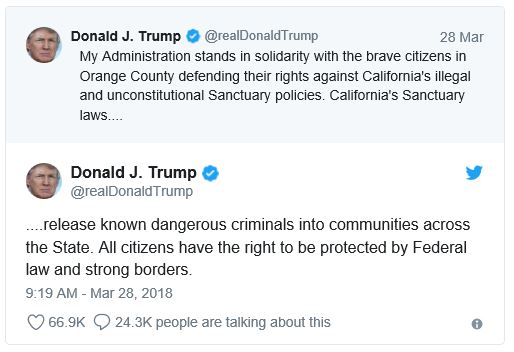
At least one anti-sanctuary Tweet was widely criticized, though, for the president’s use of the word “breeding,” seen by some as racist and a disparaging remark toward Latinos.
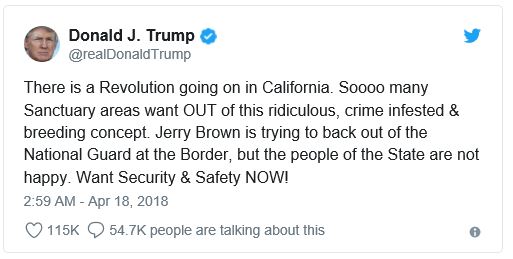
More than 35 other jurisdictions followed Los Alamitos’ vote with their own actions, mostly in the form of resolutions and some by filing amicus briefs with the federal lawsuit against the state. They include San Diego County and Newport Beach.
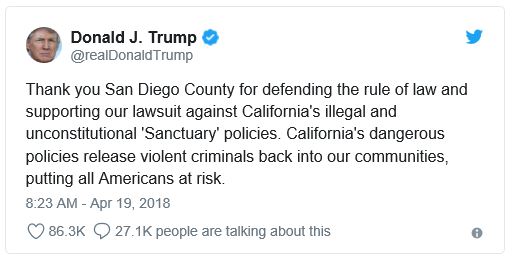
The latest to oppose sanctuary policies include cities of Santa Clarita in Los Angeles County and San Jacinto in Riverside County and the counties of Butte and Mariposa.
So-called sanctuary laws, such as California’s law to limit when local police notify federal immigration agents about people in custody who are potentially deportable, are creating disparities across the nation on who is arrested or deported, according to a newly released report by the Migration Policy Institute, a think tank in Washington D.C. that studies migration and refugee issues.
“(The) unevenness in the enforcement landscape threatens a core principle of the U.S. constitutional system—federal pre-eminence in immigration—with severe implications for effective law enforcement relationships and public safety,” according to the report released Tuesday.
The law specifically mentioned in many anti-sanctuary ordinances, SB-54, has been controversial from the get-go. And during the election season, many politicians and wanna-be politicos are making sure to let their prospective constituents know where they stand, pro or con, on the issue.
Edgar, of Los Alamitos, said he is hopeful that this latest move, an invitation to the White House, will lead to more cities “to get on board and send a message to Sacramento and Gov. Brown that they’ve overstepped their bounds regading the Constitution.”

Four Injured in Campus Riot Over Milo Yiannopoulos Speech Sue Berkeley, UC Berkeley
January 16, 2018
By Olga R. Rodriguez
Four San Francisco Bay Area residents who say they were injured by protesters during a riot ahead of a speech by a right-wing provocateur at the University of California, Berkeley filed a lawsuit against the university and the city, their attorneys said Tuesday.
The plaintiffs say in the suit filed Thursday in federal court in Oakland that officials failed to protect them from being pepper-sprayed and beaten when they were trying to attend a Feb. 1 speech by Milo Yiannopoulos, a conservative commentator. They are seeking unspecified damages.
John Jennings, his wife Katrina Redelsheimer and their friend Trever Hatch, all of San Francisco, say they were at UC Berkeley's Sproul Plaza trying to verify the event had been canceled when a masked protester struck Jennings in the right temple with a wooden stick.
When Redelsheimer tried to help her husband, a group of protesters hit her in the head with a stick and pepper-sprayed them. The group then pushed Jennings to the ground and kicked him, the lawsuit states.
Both suffered concussions, broken or bruised ribs, cuts, burns and welts on their skin from pepper spray, according to the complaint.
“We were assaulted completely out of the blue based on our perceived political affiliation by an angry mob,” said Redelsheimer, who has since moved out of California.
When the pair tried to escape over the barricades to get inside the MLK Student Center, police wouldn’t let them in, she said.
“The circumstances were such that if the police had done nothing at all, we would have been safer,” Redelsheimer said.
The suit says the masked protesters also knocked off Hatch's "Make America Great Again" red hat and pepper-sprayed him, temporarily blinding him. It says a UC Berkeley employee and a UC Davis staffer were part of the group that assaulted the trio.
The lawsuit alleges that police knew there would be trouble and didn't do enough to protect innocent bystanders.
“University officials forced college republicans to rent 60 extra policemen so they obviously anticipated a problem,” said attorney Shawn Steel.
Fellow attorney William Becker agreed.
“What you expect is law enforcement to do their job,” he said. “You don't expect to walk into an anarchist riot.”
Plaintiff Donald Fletcher of Oakland says he and some friends had left a bar and were walking toward campus when they were attacked by masked protesters. Fletcher was beaten unconscious, kicked to the ground and taken by ambulance to a hospital, the suit says.
"Fletcher continues to experience the negative psychological effects of the incident," the suit adds.
UC Berkeley police canceled the speech, citing safety concerns after what had been a peaceful demonstration turned violent when dozens of black-clad anarchists attacked some people in the crowd.
UC Berkeley spokesman Dan Mogulof said the university has not seen the suit.
"We have not yet been served with this litigation, and that means our attorneys have not seen the suit,” he said. “So, we cannot comment. Once that happens there will be a statement."
Berkeley spokesman Matthai Chakko said the city had no comment.

Berkeley Sued Over Failure to Protect Yiannopoulous Attendees
January 15, 2018
By Rachel Frommer Four residents of California's Bay Area injured during the violent University of California-Berkeley protests last year of a Milo Yiannopoulous campus appearance filed a lawsuit Thursday, alleging administrators failed to install appropriate security measures to protect attendees from harm. John Jennings, Katrina Redelsheimer, Trever Hatch, and Donald Fletcher allege they were physically attacked by masked rioters as they attempted to attend the Yiannopoulous speech in February 2017, with Berkeley "responsible for creating and exposing the Plaintiffs to the unlawful actions of an angry mob of violent anarchists," according to the complaint, first reported on by the student paper. In addition to the university, the UC Board of Regents; UC President Janet Napolitano; both the current Berkeley chancellor, Carol Christ and the chancellor at the time of the incident, Nicholas Dirks; student affairs administrators; the UC Police Department Chief of Police; the city of Berkeley; and the Berkeley Police Department are also named as defendants. The plaintiffs claim that "given the current political climate," Berkeley should have "foreseen that the protest of a controversial political figure such as Yiannopolous could likely turn violent." Yet, Berkeley did not "plan effectively," according to the suit, nor did police "intervene or employ reasonable tactical methods to ensure the safety of the plaintiffs" while the riots were underway. Officers issued "feckless disbursal orders and empty threats of arrest," according to the complaint, and barricaded areas flooded with protesters, leaving no exit open for plaintiffs and other attendees attempting to escape. Ultimately, black-clad "antifa" demonstrators set university property aflame and looted local establishments, causing an estimated $100,000 in damage. The event was cancelled, but just one arrest was made. Jennings was beaten unconscious, and Redelsheimer and Hatch were "brutally assaulted" with pepper-spray and a flagpole, according to the complaint, which references visual evidence of the assaults, including social media footage of the incidents posted by the attackers. The plaintiffs are being represented by Shawn Steel of the Shawn Steel Law Firm, who serves as chairman of the California Republican National Committee. Steel characterized the clashes on campus between students of differing ideologies as "the Left's Jihad against conservatives," in an email to the Washington Free Beacon. He said he took on the Berkeley case as "I believe it is my duty as an officer of the court and as a free speech absolutist is to defend vulnerable student conservatives." "Universities that cannot protect free speech is a university not worthy of any public support," he added. His clients are seeking compensation for their medical bills, and for security policies to be altered in order to properly protect "attendees of all future political rallies" in the city from rioters' violence. Berkeley spokesperson Dan Mogulof declined to comment Monday as the school had yet to be served with the suit. A UC-San Diego student filed a personal injury and property damage lawsuit against her administration in November 2017, a year after she was hit by a car while protesting the results of the presidential elections on an interstate. Her complaint holds the university, the regents, the city, and the state responsible for not stopping or controlling the student demonstrations in which she chose to participate, claiming they are liable for the injuries she incurred while marching on the freeway
|
Articles
2025
2024
2023
2022
2021
2020
2019
2018
2017
2016
2014
2012
1998
|